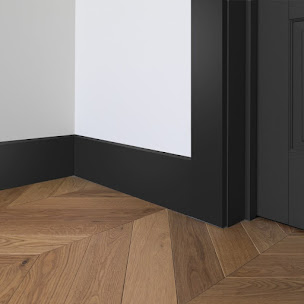How to Choose Stair Nosing for Metal and Wooden Stairs
Among the several varieties of wood Stair Nosing are:
- Hardwood Species: A variety of hardwood species, including oak, cherries, maple, and walnut, are accessible for wood nosing.
- Shapes: Wood nosing comes in a variety of shapes, such as full-round, half-round, square edge, and no overhang.
- Specialist alternatives: Double or single channel staircase nosing, aluminum stair nosing, slip-resistant stair nosing, and bullnose stair nosing are a few examples of specialist alternatives.
The Stair Nose's Thickness
Since carpeting may be used on staircases, it's critical to make sure the stair nosing matches the floor covering as closely as possible to prevent trip hazards.
Following these guidelines can support the preservation of accessibility and safety in stair design, particularly in situations where carpets or other floor coverings are present.
Slip-Resistance
Anti-slip strips are a feature that many contemporary designs have over traditional stair nosing, particularly when it comes to metal stair nosing.
You can also go with the safe square stair nosing in terms of shape.
A Look into Wooden Staircases
Wood is a gorgeous alternative for a staircase and gives your home or business design project warmth and charm. Because wood is lighter than metal, tile, concrete, or glass, it's one of the safest materials for staircases. When properly cared for and polished, wood can endure for many years.
It is crucial to think about the kind of wood you want to use for your steps, particularly if you plan to use it indoors or outdoors. Certain types of wood are better suited for outdoor use. The amount of foot traffic and how the stairs are used are also crucial factors to take into account. White oak and teak are examples of harder wood species that can withstand heavier traffic areas than soft wood flooring options like pine and fir.
At the moment, one of the more popular goods is metal Anti Slip Stair Nosing. They have become more and more well-liked by the public because of their elegant and simple design and also for their resistance to corrosion.
They can serve a wide range of users' demands in both residential and commercial settings. These nosing kinds are primarily separated into two categories: aluminum alloy stair nosing and stainless steel stair nosing.
Though there aren't many distinctions between them, aluminum alloy usually costs less and comes in a wider range of colors and styles.
Although stainless steel costs a little more, it lasts longer because of its superior resistance to corrosion. This means that a lengthy lifespan can lower later maintenance costs, which makes it especially appropriate for large-scale construction projects.
A wooden stair nosing has a more fashionable look. Because it exudes a sense of warmth and elegance. In addition, a lot of staircases in structures are made of wood. Thus, one of the main reasons wooden Stair Nosing UK is so popular is that they help create a more cohesive and integrated overall look.
They do, however, have certain disadvantages. For example, they don't last as long, and they get more damage from scratches in places where there is a lot of foot traffic.




Comments
Post a Comment